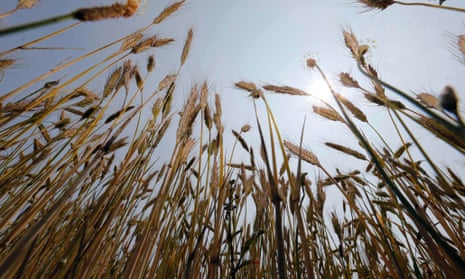Improve food distribution
United Nations’ data shows that we produce enough food for everyone to have an adequate diet, but poor distribution means that 805 million people are hungry while some 1.4 billion people are overweight or obese. We need to take the food we have and make sure it is distributed to those who need it most.
We propose helping small-scale producers, for example those in rural Africa, access markets. This will involve partnerships between local and international development agencies that can work with farmers to establish the skills and the infrastructure to market farm products. Reducing poverty in this way is a good way of ensuring food reaches those who need it most.
It’s also vital to build strategic grain reserves in famine-prone regions as a source of emergency food. This would require partnerships between non-governmental organisations, national governments and the World Food Programme.
Sustainably increase production
The UN now expects the global population to reach 11 billion by 2100. To meet this demand, we need to develop ways of producing more food while using fewer resources.
We propose supporting publicly funded research that empowers small-scale farmers in the global south to boost their productivity using low-cost technologies. This requires scientists and engineers to step outside their labs and engage meaningfully with small-scale farmers across South America, Asia, and Africa.
Public-private partnerships can also help to research precision-agriculture technologies that will allow farmers to boost production while minimising environmental impact. Everything from soil probes that can test for nutrient deficiency to satellite navigation systems linked to tractors and GPS enabled smartphones can help produce a maximum amount of food with minimal environmental disruption.
Support local food
Although most experts agree local food systems cannot feed all of us all the time, local food is still extremely important. Local food empowers farmers, links producers and consumers, and provides a line of defence between consumers and international commodity markets.
Therefore, we should invest in mid-sized and regional food processing and distribution facilities such as vegetable processing factories, canneries, and abattoirs. This will provide smaller farmers access to markets as well as helping them add value to the products they produce.
We should also enhance and establish programmes that reduce the barriers for young people wanting to become farmers. Everything from the high cost of farmland to the fact that many people have no idea how to garden means that our farm population is aging. We need to correct this and make farming a viable and exciting career for young people.
Protect the environment through policy and regulation
In much of the world, the price paid for food does not reflect the environmental cost of producing it. To address this we must move away from production subsidies on crops like corn (maize) that support environmentally destructive farming practices and unhealthy diets and focus instead on policies that reward farmers (pdf) for producing food using methods that protect wildlife and preserve water quality. Such policies could be based on paying farmers for managing well cared for environments or by taxing pollution such as carbon emissions.
Engage the public
None of these will be possible unless people everywhere demand that food be put on the public policy agenda. Therefore we must also develop educational programmes to increase food literacy skills by teaching gardening, food preserving, and cooking in schools so that consumers learn to enjoy a diet that is less taxing on the planet. And we need to engage younger people on agriculture and food security.
Evan Fraser is a Canada research chair in the department of Geography at the University of Guelph and Elizabeth Fraser is an MA candidate in global governance at the University of Waterloo. They have launched #foodcrisis, an educational initiative that includes a graphic novel about a future global food security catastrophe
Read more like this:
- From vegan beef to fishless filets: meat substitutes are on the rise
- Why it’s time to stop romanticising where our food comes from
- Food, health and sustainability: we become what we eat, and so does Earth
- Advertisement feature: The CEO of Bord Bia on Ireland’s journey towards a sustainable food system
The food hub is funded by The Irish Food Board. All content is editorially independent except for pieces labelled advertisement feature. Find out more here.
Join the community of sustainability professionals and experts. Become a GSB member to get more stories like this direct to your inbox

Comments (…)
Sign in or create your Guardian account to join the discussion